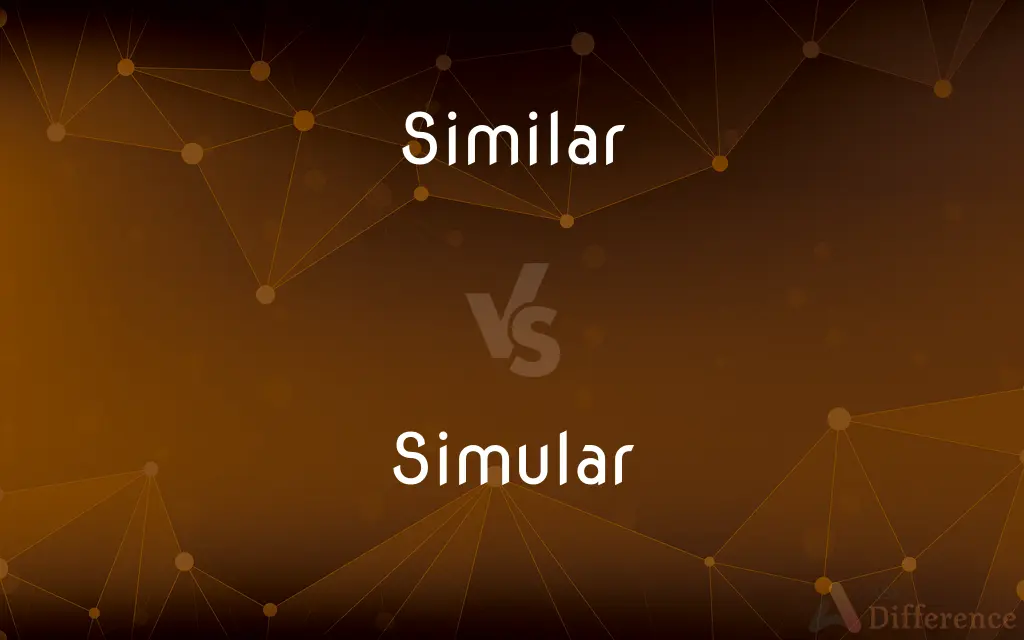Similar vs. Simular — What's the Difference?
By Urooj Arif & Maham Liaqat — Updated on April 17, 2024
"Similar" is an adjective meaning resembling without being identical, while "simular" is often a misspelling of "similar" but not recognized as a standard word in English.

Difference Between Similar and Simular
Table of Contents
ADVERTISEMENT
Key Differences
"Similar" is a commonly used adjective in English that describes things that resemble each other but are not exactly the same. On the other hand, "simular" does not appear in standard English dictionaries and is often considered a misspelling of "similar."
The usage of "similar" spans various contexts, from physical appearance to abstract concepts, indicating a degree of likeness. Whereas, the term "simular" is generally not used in formal or recognized English language discourse.
Educational materials and professional writings emphasize the correct spelling and usage of "similar" to describe comparability or likeness. In contrast, "simular" might occasionally be seen in informal communications or error-laden texts but it does not carry any recognized grammatical or lexical standing.
"Similar" is integral in comparative analyses, such as in academic, scientific, or literary discussions, where precise language is crucial. On the other hand, usage of "simular" could potentially undermine the credibility of a text due to its non-standard status.
In language learning and teaching, emphasis is placed on mastering the spelling and application of "similar." Conversely, learners are often corrected and guided away from the use of non-standard forms like "simular."
ADVERTISEMENT
Comparison Chart
Definition
Resembling without being identical
Not a recognized English word
Usage
Commonly used in formal and informal English
Mistakenly used in place of "similar"
Context
Used in a wide range of contexts to describe likeness
Rarely used correctly, typically a misspelling
Language Importance
Crucial for clear communication and education
Lacks grammatical or educational value
Recognition
Widely recognized and correctly used in English
Not recognized or standard in any formal English lexicon
Compare with Definitions
Similar
Used to compare things that share common features.
Their ideas are similar, though not exactly the same.
Simular
Common misspelling of "similar."
(Incorrect use) Their plans are quite simular.
Similar
Showing likeness or resemblance, but not identical.
The two paintings are similar in style but differ in color.
Simular
Incorrectly used when "similar" is intended.
(Incorrect use) The results of the experiments were simular.
Similar
Reflecting a degree of likeness in appearance or function.
The twins are similar, but not identical.
Simular
Not applicable as it is not a standard word.
(Note) Use similar instead of simular to avoid errors.
Similar
Pertaining to things that are alike in nature or quality.
They live in similar neighborhoods.
Simular
Often corrected in educational and professional settings.
(Note) Ensure to spell similar correctly in your essay.
Similar
Often used in discussions of analogy or similarity.
Similar arguments were presented in both cases.
Simular
Seen in informal texts or typos.
(Incorrect use) He has interests that are simular to mine.
Similar
A person or thing similar to another
He was one of those whose similar you never meet
Simular
Simulated; sham.
Similar
Having a resemblance in appearance, character, or quantity, without being identical
Northern India and similar areas
A soft cheese similar to Brie
Simular
One that simulates; a pretender.
Similar
A substance that produces effects resembling the symptoms of particular diseases (the basis of homeopathic treatment)
The principle of treatment by similars
Simular
False; specious; counterfeit
Similar
Having a resemblance in appearance or nature; alike though not identical.
Simular
(archaic) One who pretends to be what he is not; one who, or that which, simulates or counterfeits something; a pretender.
Similar
(Mathematics) Having corresponding angles equal and corresponding line segments proportional. Used of geometric figures
Similar triangles.
Simular
One who pretends to be what he is not; one who, or that which, simulates or counterfeits something; a pretender.
Christ calleth the Pharisees hypocrites, that is to say, simulars, and painted sepulchers.
Similar
Having traits or characteristics in common; alike, comparable.
My new car is similar to my old one, except it has a bit more space in the back.
Simular
False; specious; counterfeit.
Similar
(mathematics) Of geometrical figures including triangles, squares, ellipses, arcs and more complex figures, having the same shape but possibly different size, rotational orientation, and position; in particular, having corresponding angles equal and corresponding line segments proportional; such that one can be had from the other using a sequence of rotations, translations and scalings.
Similar
Of two square matrices; being such that a conjugation sends one matrix to the other.
Similar
That which is similar to, or resembles, something else, as in quality, form, etc.
Similar
(homeopathy) A material that produces an effect that resembles the symptoms of a particular disease.
Similar
Exactly corresponding; resembling in all respects; precisely like.
Similar
Nearly corresponding; resembling in many respects; somewhat like; having a general likeness.
Similar
Homogenous; uniform.
Similar
That which is similar to, or resembles, something else, as in quality, form, etc.
Similar
Marked by correspondence or resemblance;
Similar food at similar prices
Problems similar to mine
They wore similar coats
Similar
Having the same or similar characteristics;
All politicians are alike
They looked utterly alike
Friends are generaly alike in background and taste
Similar
Resembling or similar; having the same or some of the same characteristics; often used in combination;
Suits of like design
A limited circle of like minds
Members of the cat family have like dispositions
As like as two peas in a pod
Doglike devotion
A dreamlike quality
Similar
(of words) expressing closely related meanings
Similar
Capable of replacing or changing places with something else;
Interchangeable parts
Common Curiosities
Can "simular" be used in formal writing?
"Simular" should not be used in formal writing as it is considered a misspelling.
What does "similar" mean?
"Similar" means resembling without being identical.
How does the incorrect use of "simular" affect communication?
Using "simular" instead of "similar" can lead to confusion and may reflect poorly on the writer's language proficiency.
What are common contexts to use "similar"?
"Similar" is used in any context where items, ideas, or situations are being compared for likeness.
What educational advice is given regarding "simular"?
Educational advice would typically be to recognize "simular" as a misspelling and correct it to "similar."
Is "simular" a correct English word?
No, "simular" is not recognized in standard English; it is often a misspelling of "similar."
How can one remember the correct spelling of "similar"?
Remembering the root "simile," a figure of speech comparing two things, can help recall the correct spelling.
What is an example sentence using "similar"?
e.g., Their methods of research are similar in approach but vary in detail.
What should one do if they find "simular" in a text?
It's best to correct "simular" to "similar" to ensure correct English usage.
Is there any scenario where "simular" could be appropriate?
There are no scenarios where "simular" is appropriate in standard English.
What is the impact of using "similar" correctly in academic writing?
Using "similar" correctly enhances clarity and professionalism in academic writing.
Why is it important to distinguish between "similar" and "simular"?
Distinguishing between them is important for accurate communication and to maintain the standards of English writing.
How often is "simular" found in English dictionaries?
"Simular" is not found in reputable English dictionaries.
What mistake do people commonly make with "similar"?
A common mistake is mispronouncing or misspelling it as "simular."
How can educators address the confusion between "similar" and "simular"?
Educators should emphasize correct spelling and usage through examples and corrections.
Share Your Discovery

Previous Comparison
Linux vs. Minix
Next Comparison
Navy vs. UltramarineAuthor Spotlight
Written by
Urooj ArifUrooj is a skilled content writer at Ask Difference, known for her exceptional ability to simplify complex topics into engaging and informative content. With a passion for research and a flair for clear, concise writing, she consistently delivers articles that resonate with our diverse audience.
Co-written by
Maham Liaqat















































